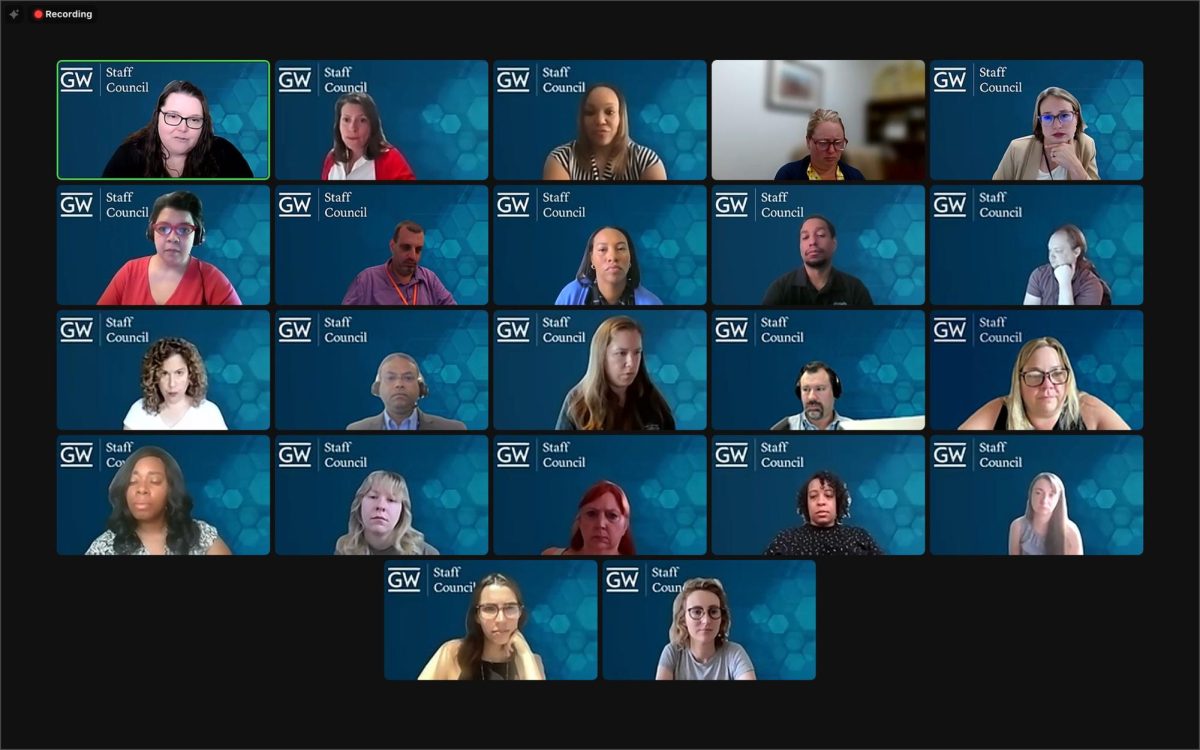Representatives from GW’s Human Resources department discussed upcoming changes to the University’s employee management software at a Staff Council meeting Friday.
Jennifer Lopez, the associate vice president of Total Rewards, who oversees payroll, compensation, benefits and Human Resources information, said GW will transition from using UGK to University-based Time Reporting System beginning on July 7. She said the new system will enhance user experience by providing additional notifications for time-off requests and allowing employees to customize their homepage to cater to each staff members’ priorities, including those who have multiple positions at the University.
Lopez said the Human Resources department will lead online training and office hours during the month of July to inform managers and employees of the new processes and explain how to use the new system properly.
She said the department announced a new time-off policy last fall, which will be effective July 1. The new model will shift to a maximum accrual limit structure under the new policy, meaning employees can continue to accrue time until they reach their maximum accrual limit, and hours can roll over from period to period.
She said the department will no longer use the ‘use it or lose it’ model, which forced staff to forfeit unused accrued time at the end of the allotted period.
“You determine now when it is best for you at what time of year to use that vacation time,” Lopez said.
Dianne Connors, the executive director of talent acquisition, said the The Wage Transparency Omnibus Amendment Act of 2023 will expand the University’s compensation and talent acquisition process by requiring officials to provide both the minimum and maximum compensation wages on all job postings, including student employment opportunities. She said this will not be a “significant change” for most staff positions because the University has been trying to post the typical hiring range for positions since 2015.
“No longer can you post commensurate with experience as the hiring range,” Connors said. “You have to actually have a good base minimum pay and maximum pay for each job.”
Connors also said the act mandates that employers cannot ask prospective employees in interviews about their past compensations and wage histories.
Staff Council President Bridget Schwartz read a question from an unspecified person in the chat who asked the Human Resources representatives if they have considered implementing a program that allows employees to donate unused sick days to their colleagues. Lopez said she is concerned that implementing a donation system would not be equitable for all employees because employees who have worked in the department longer would have more connections than their colleagues who are newer to the department.
Vice President and Chief People Officer Sabrina Minor said the department hasn’t completely ruled out the possibility of a donation program, adding that they are still in the process of researching what it would look like for staff at GW.
“We’re just taking everything into consideration, the tax implications, the individual differences in equity,” Minor said.
Nicole Mintz, the chair of the Staff Experience Committee, requested that the Human Resource department discuss offline their progress in considering a resolution passed at the April meeting that asks for staff to receive salary increases that accommodate for high inflation.
“I do want to gain clarity offline, so that we can understand where the resolution sits, how these talking points are being considered or not, so we’re on common ground,” Mintz said.
Paul Regis, the School of Business representative, said one of his constituents asked why staff don’t get to use the Student Health Center for free. Caroline Kemp, the Division of Student Affairs representative, said any DSA staff are eligible for a free Lerner Health & Wellness Center membership, and that she would look into seeing if it is possible to expand the membership to additional staff.





